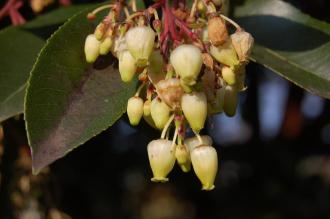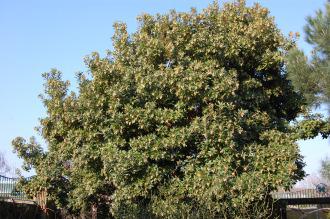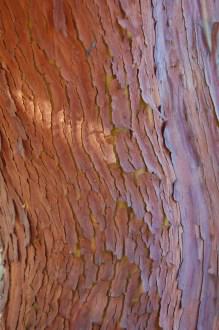
Arbutus unedo flower (11/02/2012, London)
Position: Full sun
Flowering period: Late autumn to winter
Soil: Moist, well drained
Eventual Height: 10m
Eventual Spread: 8m
Hardiness: 7b – 10a
Family: Ericaceae
Arbutus unedo is an bushy, evergreen shrub or small tree. Its dark green glossy leaves are up to 10cm long, 3cm broad with a serrated margin and leathery texture. Its branches grow near the base of the trunk, often leaning and twisting giving off a low sprawling appearance. The bark is an attractive reddish brown, which peels of in strips quite regularly to reveal brighter bark beneath. Its trunk may achieve a diameter of up to 80cm. The hermaphrodite bell shaped flowers of the plant are white in color and are produced in panicles of 10-30. The fruit is a red berry, up to 2cm in diameter, with a rough surface and is edible. The fruit takes 12 months to ripen.

Arbutus unedo (11/02/2012, London)
Arbutus unedo, commonly known as the Strawberry Tree, Apple of Cain, Cane Apple, Irish Strawberry Tree, or the Killarney strawberry Tree, is native to the Mediterranean regions and western Europe, including Ireland.
The etymological root of the binomial name Arbutus is unclear. It may be derived from the Latin name for the Strawberry Tree or derived the Celtic word arboise, the name given for a rough fruit. Unedo is derived from the Latin unus ’one’ and edo ’to eat’ in reference to Pliny’s opinion of the fruit of this tree.

Arbutus unedo trunk (11/02/2012, London)
The landscape architect may find Arbutus unedo useful as a small evergreen tree. The fruits are edible and attractive to wildlife. Once established it is tolerant of summer drought.
Ecologically, A. unedo fruits of the plant may serve as food for birds, with the flowers of the plant pollinated by bees.
The Royal Horticultural Society has given A. unedo their prestigious Award of Garden Merit in 1993.
A. unedo prefers moist, fertile, well-drained soils. It tolerates most pH of soil, including limy soils.
A. unedo requires little maintenance.
Advertisement
